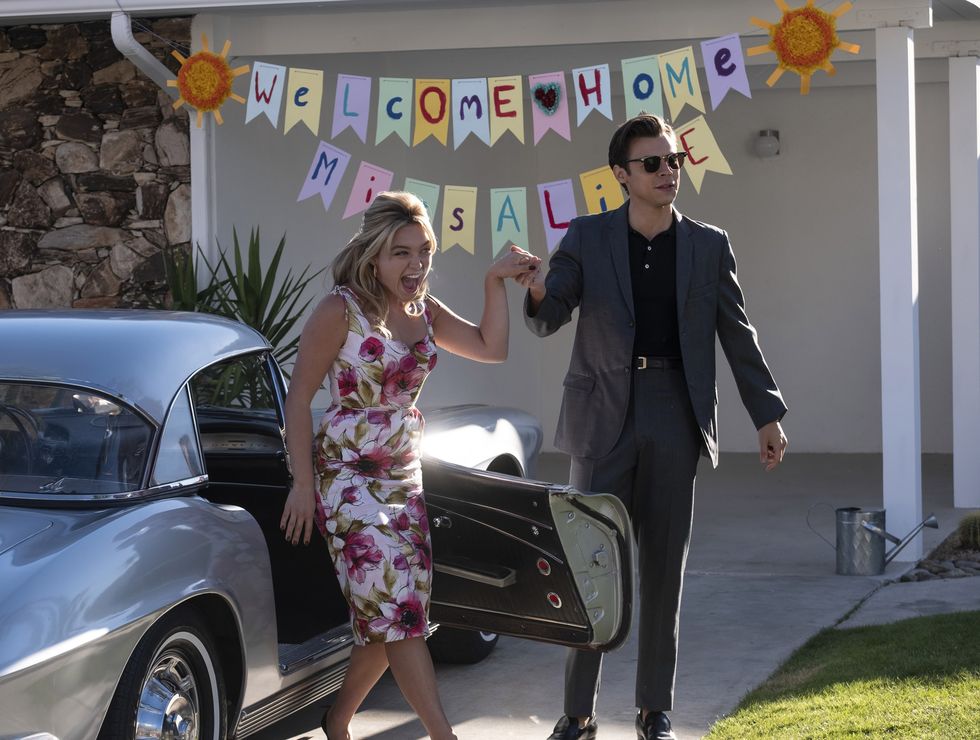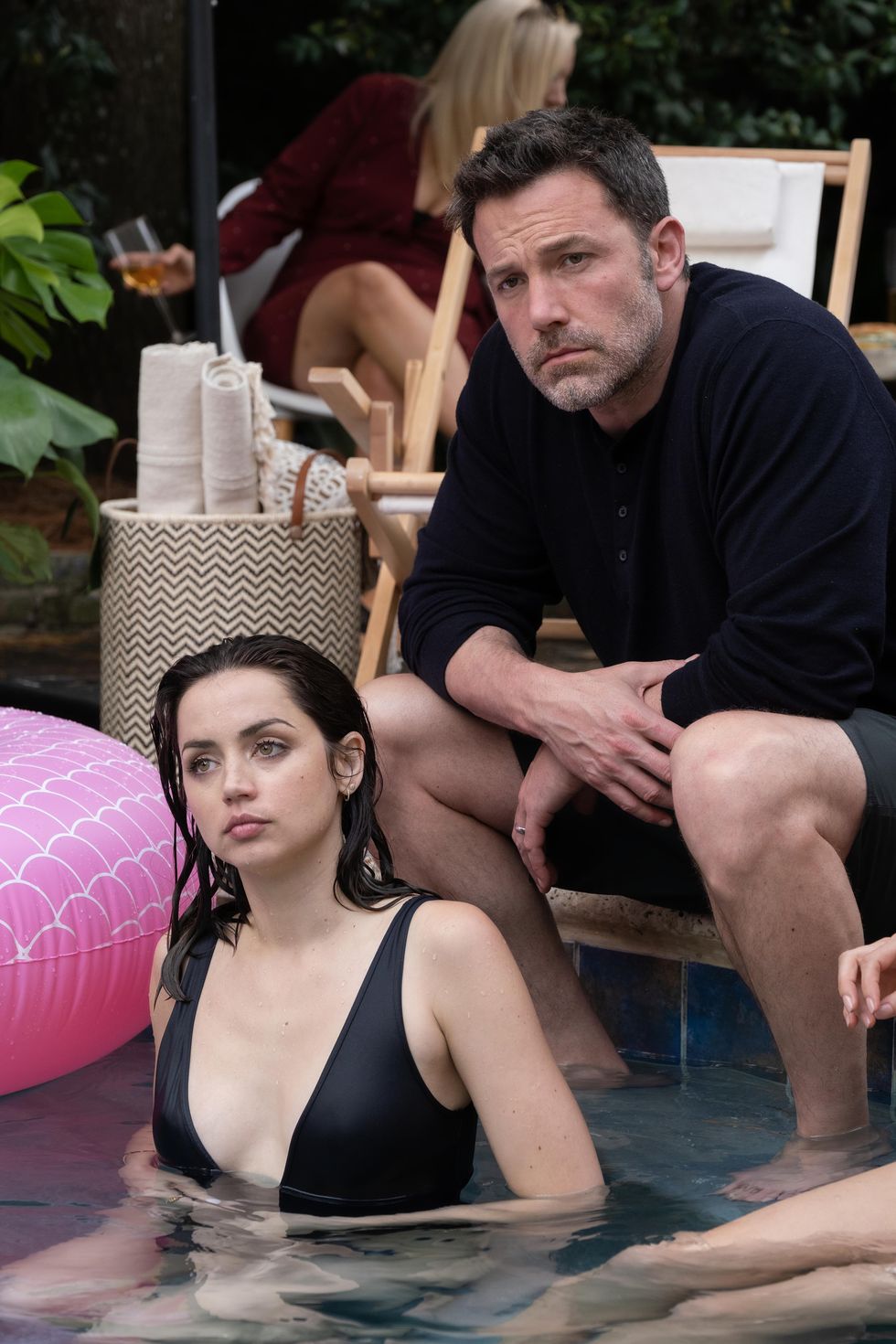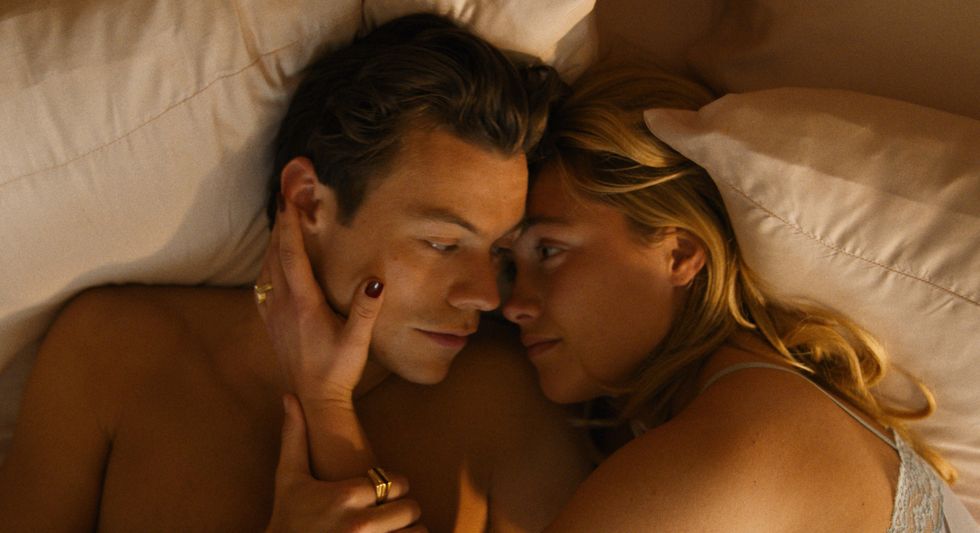In Olivia Wilde’s Don’t Worry Darling, Florence Pugh and Harry Styles star as Alice and Jack Chambers, a beautiful married couple blissfully stuck in their honeymoon phase. In an early scene, Jack returns from his mysterious job developing “progressive materials” to find Alice dressed to the nines and waiting for him with a multi-course dinner on the table. But Jack can’t be bothered with food. In the heat of passion, he tosses the dishes to the floor so he can use the table as a surface on which to pleasure his wife. Of course, everything isn’t as orgasmic as it seems.
Wilde has said that for her first film following her directorial debut–the 2019 buddy comedy Booksmart–she wanted to conjure elements of the erotic thriller, a type of movie that’s been missing from the multiplex for the past 20 years. In a recent interview with Vogue, she recalled wondering “[w]hy isn’t there any good sex in film anymore?” and cited 1980s and '90s classics like Fatal Attraction and Indecent Proposal as influences. Both of those movies were directed by erotic-thriller mastermind Adrian Lyne, who at the age of 81 seems to have also experienced a stirring in his loins for the Big Horny Energy of times past: his latest, Deep Water, starring Ben Affleck and Ana de Armas as a hot married couple struggling with extreme infidelity, just came out in the spring.
To be sure, Deep Water followed in the the direct-to-video footsteps of most erotic thrillers after a year and a half of Covid-related delays, a canceled theatrical release, and the extremely public breakup of its two costars. Yet, Lyne’s return to directing was significant: he hasn’t made a movie since 2002’s Unfaithful, widely considered to be the last nail in the erotic-thriller coffin, the most recent example of a film of this type to attain both box office dominance and critical acclaim, including an Oscar nomination for Diane Lane. By contrast, Wilde’s movie, premiering on Sept. 23, is getting an exclusively theatrical release, testing modern audiences’ appetite for a little more sex on the silver screen.
It’s been a hard fall for erotic thrillers–a potent mix of film noir and psychological horror films–which centre on illicit (and typically heteronormic) relationships, and often feature a woman whose outsized sexual appetites inevitably lead to her demise. Erotic thrillers began to dominate Hollywood just as women were entering the workforce in droves in the 1980s, with classics like Brian de Palma’s Dressed To Kill and Lawrence Kasdan’s Body Heat, peaking with Lyne’s Fatal Attraction in 1987, the third-highest grossing film released that year. Who among us can ever forget the intensity of Alex Forrest (Glenn Close) showing up at the home of her married ex-lover (Michael Douglas) and warning him that she’s not going to be ignored? The film struck a chord as a societal revenge fantasy targeting emancipated women who were “paying for their liberty with an empty bed, a barren womb,” as Susan Faludi put it in her 1991 book, Backlash. The success of the movie, which garnered six Oscar nominations, wound up spawning dozens of similarly marketed films, many of which had two-word titles (See: Basic Instinct, Indecent Proposal, Poison Ivy, etc.), contained laughably corny dialogue, and seemed to always involve Michael Douglas.
The erotic thriller flourished during the heyday of home video, making them sure bets for studios: even if the films didn’t kill it at the box office–even if they never even made it to cinemas–fans could be counted on to rent them at Blockbuster or watch on then-emerging cable channels. Then the Internet came along and rendered the genre largely obsolete, save for the occasional hit, such as 2009’s Obsessed starring Beyoncé and Idris Elba. Just at the moment the national mood was shifting in a prudish direction following the Starr Report and 9/11, sex and mainstream movies consciously uncoupled. Nobody with a high-speed Internet connection and instant access to real pornography needed to pay to see an Adrian Lyne movie. By the time Richard Gere pummelled his wife’s French lover with a snow globe in Unfaithful, the erotic thriller was already on its way out the door. Hollywood pivoted to mega-budget franchises that would lure a “four-quadrant” audience, trading steamy sex for special effects.
But after more than two years of pandemic-related lockdowns, people seem to be feeling the erotic vibes once again, longing for the days when explosive sexual relationships, as opposed to just things that go boom, were standard cinematic fare. We need look no further than the New York Times bestseller list. The top two slots in the fiction category are occupied by Colleen Hoover, an author known for erotic thrillers in book form. The podcast “You Must Remember This,” which revisits Hollywood history, recently wrapped its “Erotic 80s” season. “Erotic 90s” will premiere in the fall. And it may have taken 13 years and 26 films, but even the Marvel Cinematic Universe has acknowledged that its inhabitants may occasionally engage in physical relations: In Eternals, released last year, two ancient gods–Ikaris (Richard Madden) and Sersi (Gemma Chan)–are depicted briefly, ever-so-subtly getting it on. Sure, it’s a moment described by Esquire as “a fifteen-second bit of nothing,” followed immediately by a scene showing the two deities getting married, but in the context of a superhero franchise, it’s interesting. (In an interview, director Chloe Zhao explained that she “wanted to do [the sex scene] in a way that really communicated love.”)
The renewed interest in onscreen sex comes at a pivotal moment for women, many of whom are raging against the puritanical attitudes of a certain political party, contending with a radicalised Supreme Court, and struggling to get their careers back on track following the coronavirus pandemic. In this context, Don’t Worry Darling unfolds like a post-#MeToo, post-Roe horror story, as Alice comes to the realisation that something is seriously off about Victory, the utopian desert community where she and Jack live, and decides to investigate. The film follows certain aspects of the typical erotic-thriller trajectory, highlighting the dangers for women who dare to venture beyond the domestic sphere. But Alice presents a different type of character. She’s not a manipulative, sex-crazed femme fatale like Alex Forrest or Catherine Tramell, Sharon Stone’s iconic panty-less protagonist in Basic Instinct; rather, Alice is a smart, intuitive woman who believes she deserves to know the truth. There are no violent consequences for Alice’s expression of her sexual desires, which I suppose can be viewed as a tiny bit of progress.
The same cannot be said for Deep Water, which seems to suggest that someone needs to be punished for de Armas’s character’s passion for cheating on her husband. The film is such a narrative mess that it was unclear who the audience should be rooting for–Miranda (de Armas) or cuckolded Vic (Affleck), a retired tech millionaire whose most interesting personality trait is that he collects snails. But despite the negative reviews–the Times called it “a ridiculous murder mystery that could have worked much better as a study of sexual masochism”–Deep Water became the No. 1 film opening in Hulu’s history, according to the streamer, indicating that there’s a strong appetite for this type of content, regardless of its quality. Similarly, Netflix’s Deadly Illusions, starring Kristin Davis of Sex and the City fame as a mystery writer who begins fantasising about her children’s nanny, hit No. 1 for the streamer when it was released last year; Elle magazine declared that “it’s so bad it’s good.”
It’s not a great sign that most of the press around both Deep Water and Don’t Worry Darling centred not on the content of the films themselves but on offscreen scandals, such as whether Jennifer Lopez (ahem, Jennifer Affleck) was somehow behind Disney’s decision to cancel Deep Water’s theatrical release (unlikely); whether Chris Pine, who plays a charismatic cult leader in Don’t Worry Darling, was spat at by Harry Styles at the Venice Film Festival (also unlikely); or whether Florence Pugh and Olivia Wilde are no longer speaking to each other (“tensions are lower in the Taiwan Strait,” according to the New Yorker). Thus far–and it’s still early–reviews of Don’t Worry Darling have been mixed. According to Variety, “If you want to talk about problems related to Don’t Worry Darling, you need look no further than at what’s onscreen.” Personally, I feel that the script’s shortcomings were offset by a tremendous, emotional performance by Pugh and stunning cinematography by Matthew Libatique. Overall, the film would have benefited if Wilde leaned further into the erotic-thriller playbook, making sex more integral to the plot, as opposed to treating it like a set design flourish.
Now that the erotic thriller is back at the multiplex, we can only hope that it will continue to progress with the times, featuring more complex storylines and more diverse depictions of modern relationships. For now, we can look forward to Sanctuary, starring Margaret Qualley as a dominatrix who gets romantically involved with a young hotel scion, which critics were buzzing about at the Toronto International Film Festival earlier this month. And Paramount Plus has announced it’s working on a “deep-dive reimagining of the classic psychosexual thriller” Fatal Attraction, starring Lizzy Caplan as the bunny-boiling side-piece Alex Forrest. Let’s all pray that this time around, audiences have sufficiently evolved that they won’t be cheering “Kill the bitch!” at the end.
Rachel Dodes is a New York-based culture writer and contributor to Esquire. Her first novel, The Memo, will be published in June 2024 by Harper Perennial.
















